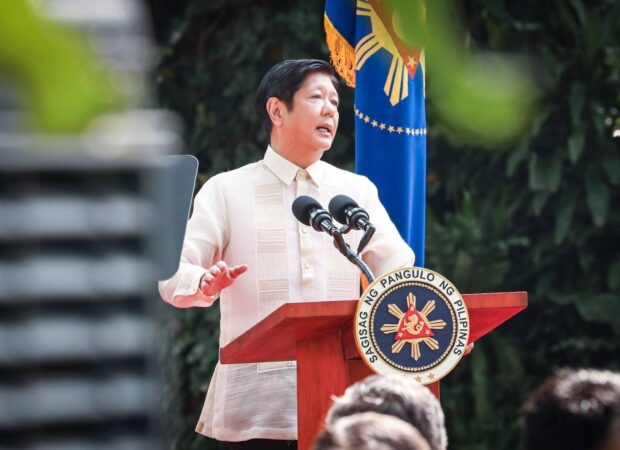Marcos on Yolanda 10 yrs after: Climate change a must in nat’l policies

President Ferdinand “Bongbong” Marcos Jr. | FILE PHOTO: PCO
MANILA, Philippines — Ten years after the catastrophic impact of Super Typhoon Yolanda in the Visayas, President Ferdinand Marcos Jr. emphasized the significance of integrating climate change into formulating national policies and strengthening the country’s disaster preparedness.
During the 10th Year Yolanda Commemoration at the Convention Center in Tacloban City, Marcos acknowledged that Yolanda was the “onset of the worst effects of climate change.”
“It is crucial to be reminded that climate change will keep exacerbating the impact of natural disasters,” said Marcos.
“We must make climate change a vital component of our national policies and make sure that we apply our knowledge on climate change to every plan, to every decision and every initiative so that we can build stronger and more resilient communities,” he added.
Article continues after this advertisementMarcos said that the government continues to build disaster-resilient evacuation and emergency operations centers, as well as put into place centralized and efficient early warning systems and disaster response strategies to address similar tragedies in the future.
Article continues after this advertisement“The government is always striving to ensure that such tragedies of this magnitude [will] be avoided and will be adapted to,” he said.
“… I therefore call on our citizens to partner with us in bolstering our country’s disaster preparedness recovery and resilience so that we can overcome whatever storms we will face,” he added.
Besides efforts to adapt to climate change, Marcos also stressed the need to expedite assistance distribution to those still awaiting aid.
He said the government has already engaged the Department of Human Settlements and Urban Development, as well as the National Housing Authority, to “accelerate the provision of housing units and land titles” to beneficiaries.
During the commemoration event alone, Marcos handed over award certificates to nine beneficiaries, representing 3,000 beneficiaries of the NHA’s Yolanda Permanent Housing Sites.
Bayanihan
Marcos, in the same event, also highlighted the “bayanihan” efforts of local government agencies, the public, the private sector and even other countries in assisting the Yolanda-ravaged areas.
“Who could ever forget the extraordinary outpouring of love and help and compassion that came from all over the country and all over the world? The volunteerism, the heroism, overflowed in the affected areas, specifically in the rehabilitation of Tacloban,” said Marcos.
READ: A decade later, ‘moving on’ still hard for Yolanda survivors
“Indeed, what we saw back then was the spirit of bayanihan in its truest form,” he added.
The President also urged the public to keep the unaccounted missing Filipinos in their hearts, emphasizing the many individuals who have yet to be found.
READ: IN PHOTOS: Looking back at Super Typhoon Yolanda’s onslaught in 2013
“We must always keep a special place in our hearts for those who we lost who are uncounted, unrecorded … we say 6,000 casualties, [but] we do not know that for sure [and] we are certain that there were more,” said Marcos.
“Even if that’s the case, let them not be unremembered, so when we grieve and when we mourn for our dead, keep a special place in your heart for those who have not been known to have gone, but we know the loss that we feel,” he added.
READ: Philippine Red Cross and Yolanda: From emergency to recovery
It was in November 2013 when Yolanda left unparalleled ruin in the provinces of Visayas, including Leyte, Eastern Samar, Western Samar, Capiz, Cebu, Iloilo, and Aklan, and Palawan, being dubbed as “Storm of the Century.”
The super typhoon affected eight million individuals, displacing four million, with at least 30 thousand injured and 6,000 dead.